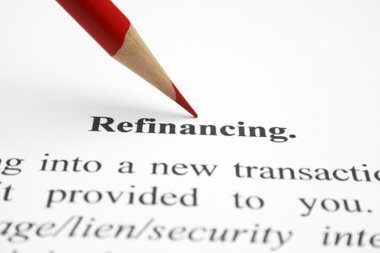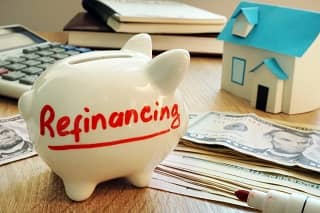 Does a mortgage refinance make sense? The answer to that common refinance question largely depends on your goals for your new mortgage and how long you plan to stay in your home.
Does a mortgage refinance make sense? The answer to that common refinance question largely depends on your goals for your new mortgage and how long you plan to stay in your home.
Indeed, there are several benefits to refinancing:
- You can lower your monthly payment by taking advantage of lower mortgage rates
- You can choose a different loan product
- You can combine two mortgages into one
- You can pay off your mortgage quicker
Whether you are choosing to refinance to today's record low mortgage rates to lower your monthly payments or you’re refinancing from an ARM to a fixed rate, each refinance decision comes with its own set of questions and considerations.
Here are answers to eight of the most common refinance questions:
No. 1: Will my refinance save me money?
Regardless of why you're considering a refinance, it's important to calculate all of the costs and potential savings before making a decision to determine if the refinance will actually save you money.
Whether or not you can save money on your refinance depends on a number of factors, including how far along you are in your existing mortgage, the new loan's interest rate, term, costs and how long you can expect to be in the new mortgage. You'll first need to at least know the breakeven point for the transaction, and that's where HSH's "Should I refinance my mortgage?" calculator can help.
Refinance savings go beyond the break-even point to where you begin to save actual dollars on your refinance. If you're planning to sell your home within a few years, it may not give you enough time to break even on a refinance. Breaking even requires making enough payments at the lower payment to save more than the cost of refinancing.
It may be possible to refinance with no out-of-pocket costs, however, there is no break-even point since the refinance cost you nothing out of pocket. That said, there will be a smaller reduction in your monthly payment since that “no-cost” refinance comes with a higher interest rate or larger loan balance.
To calculate if and when your refinance will save you money, utilize HSH.com's refinance calculator. The calculator gives you the simple "break-even" calculation so that you know how long it takes to recoup your refinance costs, but it also provides additional information about how your total interest cost and loan balance will differ when you choose to refinance with either a traditional refinance, low-cash-out refinance or a cash-out refinance.
Examining the affect on your interest costs and loan balance is the best way to determine if a refinance will be beneficial to you over the long term.
No.2: Will a lower rate alone save me money?
Loan officers may provide you with a false sense of security by calculating your new payment if they simply subtract it from your current monthly payment and call that difference "savings." But that figure isn't exactly correct in terms of your actual savings.
If your mortgage is only a couple of years old, and you can refinance to a significantly lower interest rate, lengthening your mortgage term inflicts only minimal damage. However, if you are deep into your mortgage, trading a lower interest rate for a much longer term may not save you much at all. In fact, it could cost you more. If you are 10 years or more into a 30-year loan, consider refinancing to a shorter-term loan, say, 20, 15 or 10 years.
No. 3: Do I have to refinance with my current lender?
No, you don't have to refinance with your current lender. In fact, it's wise to get refinance quotes from several other lenders before talking with your current lender.
Some mortgage lenders have retention programs they use to head off homeowners before they refinance with someone else. However, the deals they offer may not be as good as what you may find by shopping the open market. In addition, your mortgage lender may have less incentive to close your refinance quickly because it already has you as a customer with a higher interest rate.
In some cases, it is possible to leverage offers from the open market to get your current lender to cut you a deal.
For example, Janet Walker, a mortgage borrower from Phoenix, Arizona, did get her current lender to lower her mortgage rate, but not until after they made her work for it.
"I called to get my mortgage balance because I wanted to look into refinancing. My lender called me the next day offering to lower my rate. But then they said it would involve a whole application process and paying for an appraisal, and the rate they offered wasn't the best available. I shopped around and told them I'd refinance elsewhere if they couldn't match a better deal that I'd found. They finally did, but it took a while to close the loan."
No. 4: How will my home value affect my refinance?
If your home value has dropped, or if you're underwater, you still have some refinance options. But first, you'll need to know how much equity you have in your home.
While only an appraisal can give you the true current value of your home, local real estate agents can provide an estimate of your current home value, or you can get a working figure using HSH's Home Value Estimator. Once you have that information, you can divide your mortgage balance(s) by your home's value to determine its loan-to-value ratio (LTV). For example, if your home is worth $200,000 and your mortgage balance is $150,000, your LTV is 75 percent. Our KnowEquity Calculator can help you figure out your current LTV ratio.
If your current mortgage is backed by the FHA or VA, you can apply for a streamlined refinance and your home's value will not be a factor. Although the Home Affordable Refinance Program (HARP) ended on December 31, 2018, if your mortgage is owned by Fannie Mae or Freddie Mac, you may be able to refinance through the Streamline Refinance Programs that replaced it.
Other options are conventional-to-FHA refinancing (allowed up to 96.5 percent LTV), conventional-to-VA refinancing (to 100 percent LTV), or "cash-in" refinancing, in which you pay cash to reduce your mortgage balance before you close on your refinance.
No. 5: How will my credit score affect my refinance?
Today's tighter lending standards can make refinancing difficult if your credit score is low.
Before shopping for a refinance, it's worth checking all three of your credit reports and scores with the major credit bureaus Experian, Equifax, and TransUnion. Although mortgage lenders may approve mortgage loans for borrowers with compromised credit, getting the best mortgage rates usually requires a credit score of 740 or above.
According to Ellie Mae’s latest origination report, the majority of borrowers who successfully refinanced into a new conventional loan had FICO scores of 750 or above, but about 25% of those who replaced an old loan with a new one had a FICO score below 750. Of course, for conventional loans, a lower score can mean higher rates or fees. However, the FHA program does not use risk-based pricing, and so today's low FHA loan rates can still be had even for borrowers who aren't at the top of the credit scale. For FHA loans, the majority of borrowers who refinanced into an FHA-backed loan had FICO scores above 650 -- but about 20% still got a refinance completed with a FICO score below that mark.
In general, though, Fannie Mae and Freddie Mac will back loans with scores as low as 620, but risk-based fees will drive up the rate available to a low-score borrower, making it less beneficial to refinance. FHA will theoretically back loans with scores even lower than Fannie or Freddie, but lenders are wary about making too many mortgages to weak credit borrowers.
No. 6: Should I refinance to the lowest mortgage rate possible?
Many, many people have made refinancing decisions that they regretted because they based their decision solely on finding the lowest rate possible. Ask most people who took out Pay Option ARMs with those tempting 1 percent payments how they feel about them now, and you're likely to get an earful of expletives!
But refinancing for a lower payment is a valid choice as long as you know what you are getting into and have plans to deal with potential rate changes down the road.
For example, while FHA mortgage rates are about 0.30 percent lower than conventional rates, there are added fees to consider with an FHA loan which could make it more expensive. Likewise, the 5/1 ARM is closer to a half-percentage point lower than a conventional 30-year, but you must determine the future effects of rate reset with an ARM after the fixed period expires.
No. 7: Should I consider a no-cost refinance?
There really is no such thing as a no-cost refinance. Your costs are rolled into your balance, paid by you, or absorbed by the lender in exchange for a higher mortgage rate. Not that a no-cost refinance is necessarily a bad thing, especially if you don’t have the cash on hand to pay closing costs, but if you want the lowest mortgage rate and the best long-term deal, you'll have to pay some fees. To learn the best way to pay for your refinance, use HSH.com's Tri-Refi Calculator.
No. 8: What if I can’t refinance at all?
If you simply can’t refinance your mortgage you’re not out of luck. If you've got the income to refinance but can't qualify for other reasons, such as an inability to produce required income documents, or if your credit score means trouble qualifying or provides an interest rate that makes refinancing not feasible, there is an alternative strategy that can bring the same savings as refinancing: Prepaying your mortgage. HSH's unique "prepayment is equivalent to refinance" PreFism Calculator determines the effective interest rate you achieve on your mortgage by prepaying it. Alternatively, you can use HSH's LowerRate Prepayment Calculator, where you specify the effective interest rate you want your loan to be and the calculator will tell you the amount of prepayment you need to make to get the savings you want. Prepaying your mortgage is a financial strategy that saves you on interest cost over the long-haul, lowering the effective rate you pay and essentially replacing the need to refinance.
(Gina Pogol and Richard Barrington contributed to this article; Keith Gumbinger revised it.)
More from HSH.com:
- Compare mortgage rates
- HSH.com’s Prepayment::Refinance calculator
- 12 ways to get the lowest mortgage refinance rates



